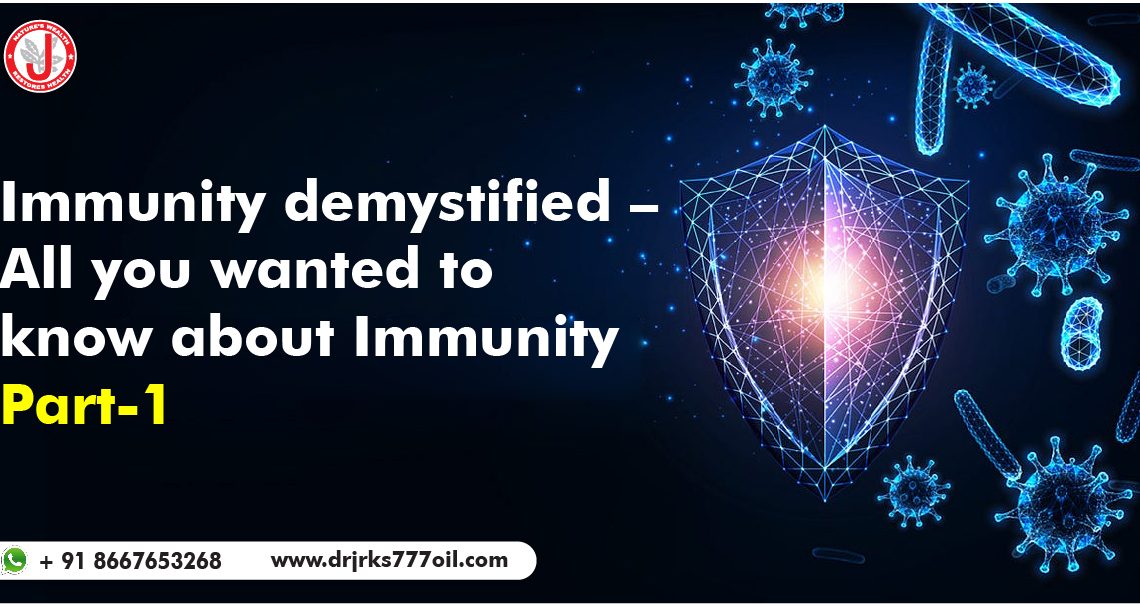

After the arrival of Covid 19 pandemic, the most searched or spoken word is, “Immunity”. People are very much interested to know about immunity and its types, its role in human body and how to improve immunity etc…Here we discuss in a detail.
What is immunity?
It is nothing but producing resistance in human body to the harmful effects of microorganisms. Immunity may be defined as resistance exhibited by host towards injury caused by microorganisms and their products. Our human body produces the antibodies immediately after releasing antigens from the microbes. Such antibodies kill the microbes and recover the human body from the gravity of disease.
Where does the immunity come from?
Thymus is the primary organ and Bone marrow is the primary tissue of immune system. T-cells and B-cells are the primary cells of immune system. These cells are responsible for both non-specific and specific immunity of human body.
What are the types of immunity?
Immunity classified into three major types.
- Innate immunity
- Active immunity
- Passive immunity
Innate immunity
Our body itself has power to build its own immunity which is called innate immunity.
Active immunity
It results when exposure to a disease organism triggers the immune system to produce antibodies to that disease. It can be acquired through natural or vaccines. Natural immunity acquired from exposure to the disease organism through infection with actual disease. Vaccine induced immunity is acquired through the introduction of a killed or weakened form of the disease organism through vaccination.
Passive immunity
It is provided when a person is given antibodies to a disease rather than producing them through his or her own immune system. A new born baby acquires passive immunity from its mother through placenta is best example. People get immunity through immune globulins is another example. The major advantage to passive immunity is that protection is immediate where as active immunity takes time to develop.
One interesting point is that passive immunity lasts only for few weeks or months but active immunity is long lasting one.
When to mature the immunity?
Immune response starts from the foetal life. It protects the foetus during pregnancy. Natural passive immunity passed to new born from mother through placenta. After birth, immunoglobulins are passed to new born through breast milk.
The infant has to depend on itself for antibody protection from 3-6 months of age. The full competence is acquired only by 5-7 years for IgG and 10-15 years for IgA. The capacity to produce antibodies starts only with the development and differentiation of lymphoid organs.
Why do we need immunity?
We have no very effective Anti-viral drugs as like bacteria and other organisms and because of less vaccines and drugs for virus diseases, we need immunity to fight the infections. In this situation, we have only two options. One is prevention and another is improving our own immunity. They save the human body from the diseases.
The best example is COVID19 virus which is new to human being. So we have no specific immunity to this disease. Either every one or more than 50% of population exposed to this antigen and get antibodies or vaccines will save the community from this fatality. So our own immunity is important to invade the virus and protects our body.
Does the immunity declines with age?
Yes. As we age, the strength of immunity declines. Physiological immune deficiency occurs at the extremes of life. The decline of immune response in the elderly is known as Immune senescence. As age increasing the following are happening
T-Cell response declines
Antibody production decreases
Response to vaccination reduces
Susceptibility to infection increases
Above are the reasons, why the elderly people get community acquired pneumonia (type of lung problem) and Urinary tract infections frequently.
(To be continued in Part-2)
